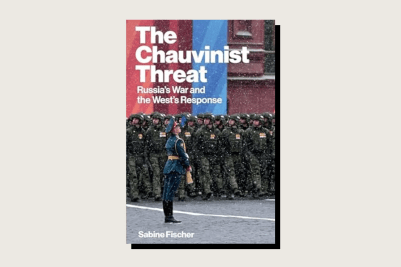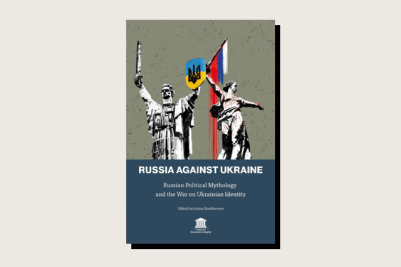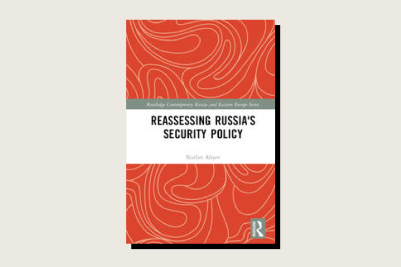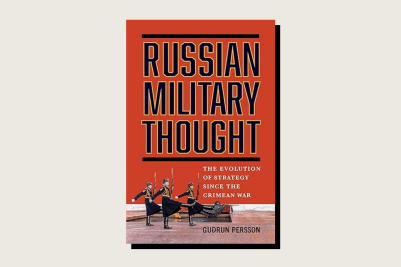7 New Books on Russia and Its War in Ukraine
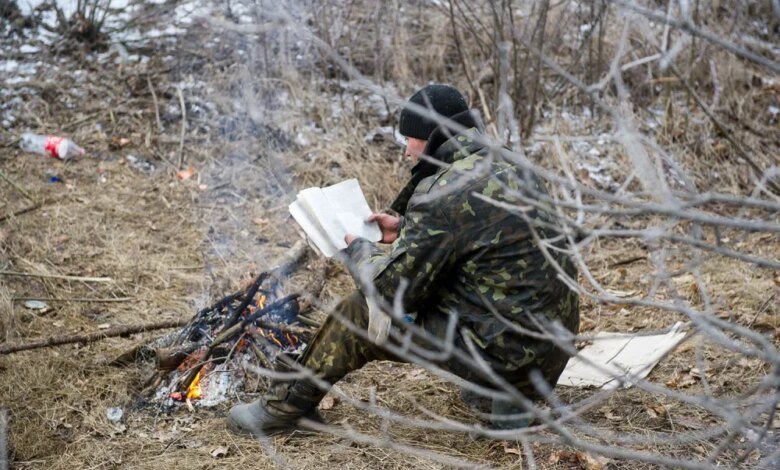
What prompted Russian President Vladimir Putin to invade Ukraine? Is it part of a wider war with the West—whatever “West” means these days? And how does Russia fight this conflict? Are the strategy and tactics novel, or are they rooted in the Soviet and tsarist past? And perhaps most importantly, why did so few of our supposed experts see this coming? This is not an academic question for international relations theorists. More than a million Ukrainian and Russian military casualties—not to mention the killed, maimed, traumatized, and bereaved civilians—are the price of Europe’s biggest security policy failure since the 1930s.
Answers to these questions will shape the world for the coming years, yet they are contentious. Realist international relations theorists such as John Mearsheimer insist that Russia has no grand design; it is just responding to provocations, chiefly NATO expansion. A raft of foreign policy bigwigs, such as Sir Tony Brenton, a former British ambassador to Moscow, insist that the war is limited to Ukraine and that Russia has no intention of attacking NATO. Even those who concede that Russia is conducting some kind of offensive in Europe and North America—with a dirty-tricks cocktail including election interference, drones, sabotage, assassinations, and other mischief—disagree on whether this a new kind of warfare and what Moscow hopes to achieve.
Luckily for those with time on their hands, a crop of new books, ranging from the academic to the highly personal, offers answers on all fronts. I’ve read them so that you don’t have to.
My Russia: What I Saw Inside the Kremlin, Jill Dougherty, Lyons Press, 368 pp., $32.95, April 2025
The most readable is My Russia: What I Saw Inside the Kremlin by the veteran CNN correspondent Jill Dougherty, whose career highlights (or lowlights) include being kissed—against her will and to her surprise—by Putin. The book’s narrative arc starts with her teenage infatuation with Russia’s language and culture, and ends with Russia’s full-scale invasion of Ukraine, when she hurriedly left the country that had been her home and lodestar for decades. Dougherty’s journalistic memoir features vivid pen-portraits of decision-makers, vignettes from her reporting (crime, terrorism, disaster, corruption), and occasional glimpses into her personal history, all against the backdrop of the logistical and bureaucratic challenges of working life in Moscow. For those wanting to get up to speed on Russia’s post-Soviet history, she is an enticing guide.
Commendably, Dougherty does not rewrite history to make herself look wise. Also to her credit, she has been one of the few veteran Russia correspondents to acknowledge frankly that her thinking about the country had been mistaken. Despite her revulsion at Russia’s dark side, she genuinely believed in the country’s future, loved much of what she encountered, and hoped that light would triumph over darkness. But she offers a pithy and unsentimental guide to Putin’s behavior and worldview. He is both arsonist and firefighter, she writes, stoking conflicts in order to then offer Russia as “peacekeeper” even as it keeps pieces of the countries involved. In Putin’s view, the West—meaning United States-led alliances of big industrialized countries—is duplicitous, menacing, but weaker than it looks; Russia was weak, but now it’s strong, and under his leadership, it can triumph. The hallmark of his policy is resentment at the collapse of the Soviet Union and at the humiliation that followed. Neurotic insecurity, Dougherty concludes, is ingrained in Russia today. The unstated inference is that conflict with the West and its pursuit through sub-threshold warfare is baked into the Kremlin’s worldview.
The Chauvinist Threat: Russia’s War and the West’s Response, Sabine Fischer, Polity, 220 pp., $25, January 2026
Similarly readable, though less personal, is Sabine Fischer’s polemical The Chauvinist Threat: Russia’s War and the West’s Response. Fischer draws on feminist theory to depict Russia as a kind of geopolitical wife-beater. Coming from someone rooted in the scandalously indulgent German mainstream approach to Russia, her forthright criticism of the Putin regime’s authoritarianism and imperialism is striking. Fischer was a regular presence at the Kremlin-sponsored Valdai Discussion Club—named after the location of Putin’s private dacha—even after Russia’s initial invasion of Ukraine in 2014. But her conclusion is apposite and powerful. Forget the United States; it is Europe that must defend itself, aid Ukraine, and defeat Russian imperialism, she argues. If only more Germans had said that earlier.
Critics may find a tinge of Orientalism in Fischer’s book. She starts with her first visit, to St. Petersburg in January 1992. The view from the airport bus was obscured with heavy sleet: a metaphor, she writes, for Russia’s future. “Nobody could have foreseen where they would end up.” This approach risks exoticizing Russia; we are only a step away from Fyodor Tyutchev’s hackneyed warning that “Russia cannot be known by the mind / Nor measured by the common mile: / Her status is unique, without kind – / Russia can only be believed in,” or Winston Churchill’s dictum that Russia is an unforecastable “riddle, wrapped in a mystery, inside an enigma.”
In fact, for those who were willing to look and listen, the continuity between the old Soviet Union and the new, supposedly democratic Russia was already clear in the early 1990s. Bruce Clark, later a distinguished Economist journalist, wrote a blistering book published in 1995 called An Empire’s New Clothes: The End of Russia’s Liberal Dream. The Baltic states of Estonia, Latvia, and Lithuania, along with other former inmates of the Soviet imperial prison, repeatedly warned the rest of Europe that Russia’s dark heart was still beating. Fischer, like Dougherty, was part of a journalistic and analytic consensus that for too long ignored such warnings.
Russia Against Ukraine: Russian Political Mythology and the War on Ukrainian Identity, ed. Anton Shekhovtsov, Centre for Democratic Integrity, 117 pp., 2025
A book about these failures remains to be written. But the startling and central role Ukraine plays in Russia’s neurotic nationalism is pithily outlined in Russia Against Ukraine: Russian Political Mythology and the War on Ukrainian Identity, edited by Anton Shekhovtsov, a Ukrainian visiting professor at Central European University, and published as a free digital book by the Vienna-based Centre for Democratic Integrity. It begins with an essay by Galia Ackerman, the doyenne of French Kremlin-watchers, titled “The Deep Roots of Russian Ukrainophobia.” This highlights the obsessive interest shown by Nikolai Patrushev, a close Putin confidant, in Ukraine’s supposedly intrinsic Nazism (yes, it makes no sense). The Vienna-based Russian historian Alexander Etkind writes on the meaningless but sinister “Z” symbol, and the British scholar Andrew Wilson explores the intellectual origins of Russia’s negation of Ukraine’s existence. These include the ideas of German philosopher Carl Schmitt (nowadays enjoying a new fan base among some U.S. conservatives) and the cult-like managerialism of the Soviet-era “methodologists.” Did you know that the Russian national identity is a “Hegelian absolute,” defined by plans at the center, not realities at the periphery? You do now.
This is not just Ukraine’s problem. Russia believes it is at war with the West, whatever those at the receiving end may think about it. Despite escalating attacks on infrastructure, airspace violations, and other stunts, public opinion in most of Europe is ignorant about both the extent of Russia’s hostility and the way it is manifested, with cyberattacks, sabotage, propaganda, subversion, and other tactics.
Reassessing Russia’s Security Policy, Nurlan Aliyev, Routledge, 298 pp., $56.99, May 2025
The paradox here is that Russia is so much weaker than the countries it tries to confront—at least so long as they work together. With an economy roughly the size of Italy’s, Russia is surely at most a nuisance, not a threat, right? The Warsaw-based scholar Nurlan Aliyev unpacks this well in his excellent new book, Reassessing Russia’s Security Policy. Asymmetry fuels Russia’s paranoia: Its rulers see it as a “besieged fortress.” It also dictates their response. Russia cannot defeat its adversaries in an all-out confrontation. But in the eyes of its rulers, it must fight them, or face defeat at their hands. So Russia uses other approaches to catch them off balance, divide and weaken them.
Aliyev outlines the roots of this thinking, going back to the talented tsarist officer Evgeny Messner, who fought for the losing Whites in Russia’s post-1917 civil war and ended up in Argentina. The Nazi-sympathizing Messner’s books on “struggle through rebellion” made little impact when they were published in exile in the 1950s and 1960s. “Guerilla [warfare] and insurgency, unrest and unlimited terror, destruction of the foundations and beliefs of societies, and attacks on the consciousness of the population will be the battlefields,” Aliyev writes of Messner’s “mutiny warfare” prediction, “and the lines between peace and war will be permanently blurred.” That sounds like a manual for the so-called hybrid warfare Russia is waging on NATO countries right now.
Non-Military Warfare: A War of Our Time, eds. Oscar Jonsson and Ilmari Kaihko, Routledge, 236 pp., $150, August 2025
A must-read book here is Non-Military Warfare: A War of Our Time, edited by Oscar Jonsson and Ilmari Kaikho, both of the Swedish Defence University. It ranges through the different dimensions of nonkinetic warfare, including the weaponized use of the legal system (lawfare), exploitation of diaspora ties, and technological competition. This kind of conflict stretches our thinking about categories such as war and peace, and combatant and noncombatant. A particularly thought-provoking essay by Jan Angstrom, also of the Swedish Defence University, looks at the meaning of defeat and victory in this sphere. It argues that the decisive factor in the long run is not the damage you do to your opponent, but the compromises you make at home. Put crudely, don’t fight Putinism by Putinizing your own society.
So much for tactics. But what about strategy? It used to be said that Putin was an effective opportunist but that his regime lacked both ideology and strategy. These contentions look increasingly hard to sustain. Two new books look at Russia’s military and strategic culture, each highlighting its continuity with the tsarist and Soviet eras. Andrew Monaghan, of the Royal United Services Institute in London, begins Blitzkrieg and the Russian Art of War by lambasting others for their lazy and error-strewn approach. “Throughout the 2010s, officials and observers persistently misinterpreted Russian theory and practice though a blend of wishful thinking, soundbites and buzzwords,” he writes. They ignored, he says, intent, history and culture; conflated grand strategy and military strategy; posed the wrong questions and got the wrong answers.
Blitzkrieg and the Russian Art of War, Andrew Monaghan, Manchester University Press, 348 pp., $21.29, July 2025
This critique would be more powerful if Monaghan explained specifically which of his rivals he is criticizing. But he is right that Western analysts mostly failed to grasp Russia’s turn towards military aggression (first in Georgia in 2008, then in Ukraine, initially in 2014 and then with the full-blown invasion of 2022). They also wildly overestimated the likelihood of Russian victory. Some argued—in Foreign Policy, no less—that it was pointless even to send any weapons to Ukraine. Following Russia’s disastrous setbacks at the start of the war, the analysis flipped to the other extreme: Russia’s hidebound, corrupt military would crumble, revolt, and collapse. The current conventional wisdom, that Ukraine is slowly losing a war of attrition, is likely to be similarly inaccurate.
Monaghan argues that Russia does not see war as a purely military phenomenon but as just one dimension in a “wider sociopolitical conflict.” Democracies may outsource defense to their militaries; Russia does not. Russia’s military thinking includes both lightning war (the Blitzkrieg of the book’s title) and, if that fails to achieve a quick victory, the exhaustion of the adversary through attrition. Outsiders may see Russia’s war in Ukraine, having switched from the first to the second, as a terrible error. That view might make sense in Western eyes, but it is not shared by those making decisions in Russia.
Russia’s war strategy, Monaghan notes, easily envisions the conflict in Ukraine escalating into a regional or wider war. This would involve the full-scale mobilization of Russia’s entire economic and military resources, something not seen since Stalin’s time.
Russian Military Thought: The Evolution of Strategy Since the Crimean War, Gudrun Persson, Georgetown University Press, 240 pp. $32.95, November 2025
The biggest question remains Russian decision-making. What really happens inside that black box in the Kremlin? Here the Swedish expert Gudrun Persson offers some thoughts in her definitive Russian Military Thought: The Evolution of Strategy Since the Crimean War. Outsiders tend wrongly to assume that Russia’s policy evolves in response to outside behavior; the myth that Putin’s war on Ukraine is the necessary result of NATO expansion is a prime example of this. Persson argues that this “action-reaction” paradigm is inadequate to explain either Soviet or Russian behavior. Instead, Russia acts on what it perceives to be its own interests and on its intelligence-based predictions. It mirrors outside behavior without necessarily understanding it. “Russia today complains about the West, and then does what it perceives the West is doing, using methods of their own invention,” she writes.
Like other authors, Persson highlights the asymmetrical thinking at the heart Russia’s approach to international conflict and its full-spectrum approach, with echoes of the Soviet period: “Almost every part of society is increasingly seen as a battlefield that spans everything from nuclear weapons to history, culture and science.”
Don’t feel daunted by this reading list. Russia’s war won’t be over anytime soon.
Don’t miss more hot News like this! Click here to discover the latest in Politics news!
2025-10-17 18:30:00

